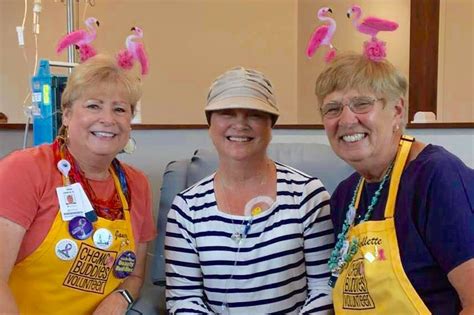
A woman undergoing chemotherapy treatment found renewed joy and engagement by reminiscing about past travels and planning future adventures with her daughter during their chemotherapy sessions, highlighting the positive impact of shared experiences and forward-looking conversations on coping with challenging medical treatments.
During chemotherapy, the arduous process of medical treatment often leaves patients drained, both physically and emotionally. For many, finding moments of normalcy and happiness becomes a crucial part of coping with the ordeal. One mother discovered a unique method to combat the emotional toll of chemotherapy: discussing past and future travel plans with her daughter, which significantly improved her mood and outlook. This simple yet powerful strategy serves as a testament to the profound impact that positive conversations and shared dreams can have on individuals facing difficult health challenges. The act of revisiting fond memories and envisioning future adventures provided a much-needed escape from the harsh realities of cancer treatment.
The woman, whose story was shared via Yahoo Lifestyle, revealed that talking about travel acted as a “chemo buddy,” a source of comfort and distraction during her chemotherapy sessions. She explained that recalling past trips and mapping out potential future vacations with her daughter, effectively “brought her spark back” and alleviated some of the emotional burden of the treatment. This underscores the importance of finding personalized coping mechanisms that resonate with individual interests and values. Travel, in this case, wasn’t just a topic of conversation but a pathway to reconnecting with a sense of self and purpose beyond the confines of illness.
According to the Yahoo Lifestyle article, the woman shared that “sitting in the chemotherapy treatment, [she] felt so tired and down, but talking about our travels really brought [her] spark back.” This direct quote emphasizes the immediacy and effectiveness of the approach. It wasn’t a long-term therapy or a complex intervention; it was a simple, readily available tool that she could use in the moment to lift her spirits and ease her discomfort. The act of verbalizing positive memories and future aspirations served as a potent antidote to the negativity and fatigue associated with chemotherapy.
The power of positive distraction is a well-documented phenomenon in the fields of psychology and medicine. Engaging in activities that capture one’s attention and evoke positive emotions can effectively reduce stress, anxiety, and even pain perception. By focusing on the excitement and anticipation of travel, the woman was able to divert her attention away from the unpleasant aspects of her chemotherapy treatment. This allowed her to experience moments of joy and normalcy amidst a challenging and often overwhelming situation.
Moreover, the act of planning and dreaming about future travel can provide a sense of hope and purpose. It can serve as a reminder that life extends beyond the current medical challenges and that there are still adventures to be had and experiences to look forward to. This forward-looking perspective can be particularly valuable for individuals undergoing long-term treatments, as it helps them maintain a sense of optimism and motivation.
The daughter’s involvement in these travel conversations further enhanced their positive impact. The shared experience of reminiscing about past trips and planning future ones created a sense of connection and support between mother and daughter. This shared joy and anticipation strengthened their bond and provided the mother with a sense of companionship and encouragement during a difficult time. The daughter’s active participation demonstrated her unwavering support and willingness to engage in activities that brought her mother joy and comfort.
The approach highlights a crucial aspect of cancer care: the importance of addressing the emotional and psychological needs of patients in addition to their physical well-being. Chemotherapy can have significant emotional side effects, including anxiety, depression, and feelings of isolation. By actively seeking out ways to cope with these emotional challenges, patients can improve their overall quality of life and enhance their ability to tolerate treatment.
The “chemo buddy” concept extends beyond travel. Any activity or topic that brings joy, comfort, or a sense of connection can serve as a valuable coping mechanism during chemotherapy. This could include discussing hobbies, sharing stories, listening to music, watching movies, or engaging in creative pursuits. The key is to find activities that resonate with the individual’s interests and values and that provide a temporary escape from the challenges of treatment.
Healthcare professionals are increasingly recognizing the importance of integrating psychosocial support into cancer care. Many cancer centers offer a range of services designed to address the emotional and psychological needs of patients, including counseling, support groups, and mind-body therapies. These services can help patients develop coping strategies, manage stress, and improve their overall well-being. The story of the mother and daughter using travel as a “chemo buddy” underscores the potential benefits of these supportive interventions.
The power of human connection should not be underestimated. Talking to loved ones, sharing experiences, and receiving emotional support can have a profound impact on a patient’s well-being. The daughter’s willingness to engage in these travel conversations provided her mother with a sense of connection, support, and validation. This emotional support played a crucial role in helping her mother cope with the challenges of chemotherapy.
In addition to discussing travel, the mother and daughter also engaged in practical planning for future trips. This included researching destinations, comparing prices, and making reservations. This practical engagement served as a tangible reminder that their travel dreams were within reach and that they had something to look forward to. The act of planning also provided a sense of control and agency, which can be particularly empowering for individuals undergoing medical treatment.
The story also illustrates the resilience and adaptability of the human spirit. Faced with a challenging medical diagnosis and a demanding treatment regimen, the mother found a way to reclaim her joy and engagement in life. By focusing on her passions and connecting with her loved ones, she was able to navigate the challenges of chemotherapy with grace and resilience. Her story serves as an inspiration to others facing similar challenges.
Ultimately, the “chemo buddy” strategy highlights the importance of personalized coping mechanisms in cancer care. There is no one-size-fits-all approach to managing the emotional and psychological challenges of chemotherapy. Each individual must find activities and strategies that resonate with their own interests, values, and needs. By embracing their passions and connecting with their loved ones, patients can navigate the challenges of cancer treatment with greater resilience and find moments of joy amidst adversity.
The positive effects of anticipating future events have been extensively studied in psychology. Research suggests that looking forward to positive experiences can boost mood, reduce stress, and even improve physical health. The anticipation of travel, in particular, can be a powerful motivator and source of joy. Planning a trip can provide a sense of purpose, excitement, and optimism, all of which can be beneficial for individuals facing health challenges.
The article emphasizes the importance of proactively seeking out coping mechanisms and support systems. Rather than passively enduring the emotional challenges of chemotherapy, patients can actively engage in activities that bring them joy and connect them with others. This proactive approach can empower patients to take control of their well-being and improve their overall quality of life.
The woman’s story is a testament to the power of human connection, positive thinking, and personalized coping strategies. By embracing these elements, individuals facing challenging medical treatments can find moments of joy, connection, and resilience amidst adversity. Her experience serves as a reminder that even in the face of illness, it is possible to find meaning, purpose, and happiness.
The impact extends beyond the individual undergoing treatment, affecting the caregiver as well. The daughter, by engaging in these conversations and helping her mother plan future trips, likely experienced a sense of purpose and connection. Caregiving can be emotionally taxing, and finding ways to share moments of joy and connection can alleviate some of the burden. The act of planning and dreaming together provided both mother and daughter with a shared sense of hope and optimism.
Moreover, the story underscores the importance of open communication between patients and their healthcare providers. While the “chemo buddy” strategy is a personal one, it can be beneficial to discuss it with healthcare professionals. They can provide guidance on other coping mechanisms and support services that may be available. Open communication can also help healthcare providers better understand the patient’s emotional needs and tailor their care accordingly.
The story serves as a reminder that cancer treatment is not just about physical healing but also about emotional and psychological well-being. By addressing the emotional needs of patients, healthcare providers can improve their overall quality of life and enhance their ability to tolerate treatment. The “chemo buddy” concept highlights the potential benefits of integrating psychosocial support into cancer care.
The article’s main point revolves around the power of positive thinking and shared experiences in coping with the emotional challenges of cancer treatment. It encourages patients and their loved ones to find personalized coping mechanisms that resonate with their interests and values. By focusing on positive memories, planning future adventures, and connecting with others, individuals can navigate the challenges of cancer treatment with greater resilience and find moments of joy amidst adversity. The narrative emphasizes the importance of addressing the emotional and psychological needs of patients in addition to their physical well-being.
The strategy is adaptable and can be tailored to suit individual circumstances. For instance, if travel is not feasible, patients could focus on other hobbies or interests that bring them joy. This could include gardening, painting, reading, or listening to music. The key is to find activities that provide a sense of distraction, purpose, and connection.
The “chemo buddy” concept also highlights the importance of self-care for caregivers. Caring for someone undergoing cancer treatment can be emotionally and physically demanding. It is essential for caregivers to prioritize their own well-being and find ways to recharge. This could include engaging in hobbies, spending time with friends, or seeking professional support.
The positive impact of the “chemo buddy” strategy extends beyond the duration of cancer treatment. The memories created during this time can serve as a source of comfort and strength in the years to come. The act of planning and dreaming together can strengthen bonds and create lasting memories that enrich the lives of both patients and their loved ones.
The concept also encourages patients to embrace their individuality and find their own unique ways of coping with cancer treatment. There is no one-size-fits-all approach to managing the emotional challenges of illness. What works for one person may not work for another. It is important to experiment with different strategies and find what resonates best with one’s own personal style and preferences.
The story emphasizes the importance of finding meaning and purpose in life, even in the face of adversity. By focusing on their passions, connecting with their loved ones, and setting goals for the future, individuals can find a sense of purpose that helps them navigate the challenges of cancer treatment with greater resilience.
The “chemo buddy” strategy also highlights the importance of celebrating small victories. Cancer treatment can be a long and arduous process. It is important to acknowledge and celebrate each milestone along the way, no matter how small. This could include completing a chemotherapy session, managing side effects, or simply having a good day.
The approach serves as a reminder that cancer is not just a physical disease but also an emotional and spiritual one. Addressing the emotional and spiritual needs of patients is essential for promoting overall well-being and enhancing their ability to cope with treatment. The “chemo buddy” concept provides a framework for addressing these needs by fostering positive thinking, connecting with loved ones, and finding meaning and purpose in life.
The story reinforces the importance of gratitude. Focusing on the things one is grateful for can help shift perspective and improve mood. This could include appreciating the support of loved ones, the beauty of nature, or the simple pleasures of life. Practicing gratitude can be a powerful tool for coping with the emotional challenges of cancer treatment.
The “chemo buddy” strategy highlights the importance of finding joy in the present moment. While it is important to plan for the future, it is also essential to appreciate the present moment and find ways to experience joy and connection in everyday life. This could include spending time with loved ones, engaging in hobbies, or simply taking time to appreciate the beauty of the world around us.
The woman’s story also illustrates the power of vulnerability. Sharing her experiences with others allowed her to connect with people who understood what she was going through and to receive support and encouragement. Being vulnerable and open about one’s struggles can be a powerful way to cope with the emotional challenges of cancer treatment.
In conclusion, the “Chemo Buddy: Mom’s Spark Returns Talking About Travel” story demonstrates the transformative power of positive connection and proactive engagement in coping with the emotional and psychological effects of chemotherapy. By focusing on positive memories, planning future experiences, and fostering open communication, patients and their caregivers can navigate the challenges of cancer treatment with greater resilience, find moments of joy amidst adversity, and strengthen their bonds along the way. The story underscores the importance of personalized coping strategies, the value of human connection, and the potential for finding meaning and purpose even in the face of illness.
Frequently Asked Questions (FAQ):
1. What is the main point of the article “Chemo Buddy: Mom’s Spark Returns Talking About Travel”?
The article highlights how a mother undergoing chemotherapy regained her spark and improved her emotional state by discussing past travels and planning future trips with her daughter during chemotherapy sessions. This strategy served as a “chemo buddy,” providing a positive distraction and a sense of hope amidst the challenging treatment.
2. How did talking about travel help the woman during her chemotherapy sessions?
According to the article, talking about travel “brought her spark back.” It provided a distraction from the fatigue and negativity associated with chemotherapy, allowing her to reminisce about positive experiences and look forward to future adventures. This created a sense of normalcy and joy during a difficult time.
3. Why is it important to address the emotional and psychological needs of cancer patients undergoing chemotherapy?
Chemotherapy can have significant emotional side effects, including anxiety, depression, and feelings of isolation. Addressing these emotional needs is crucial for improving a patient’s overall quality of life, enhancing their ability to tolerate treatment, and promoting their sense of well-being. The “chemo buddy” strategy demonstrates one way to address these needs.
4. Can the “chemo buddy” concept be applied to other activities besides travel?
Yes, the “chemo buddy” concept can be adapted to any activity or topic that brings joy, comfort, or a sense of connection. This could include discussing hobbies, sharing stories, listening to music, watching movies, or engaging in creative pursuits. The key is to find activities that resonate with the individual’s interests and values.
5. What role did the daughter play in the “chemo buddy” strategy, and why was her involvement important?
The daughter’s involvement was crucial. By actively participating in travel conversations, reminiscing about past trips, and helping her mother plan future adventures, she provided emotional support, companionship, and a sense of connection. This shared joy and anticipation strengthened their bond and provided the mother with a sense of hope and encouragement during a difficult time. Her involvement highlights the importance of family support in coping with cancer treatment.









